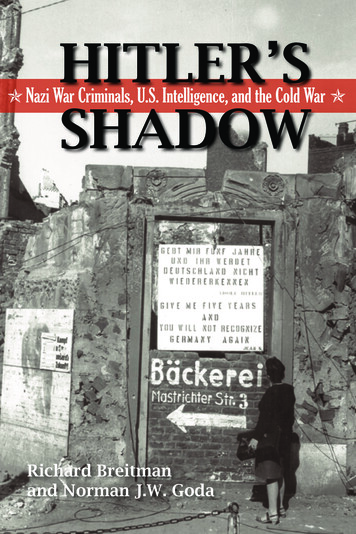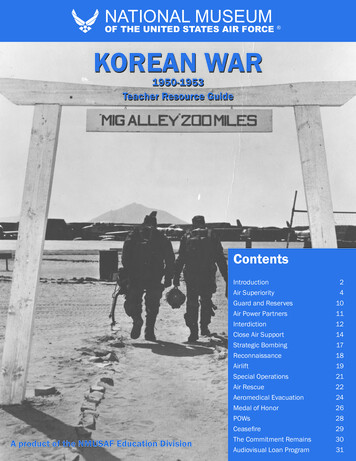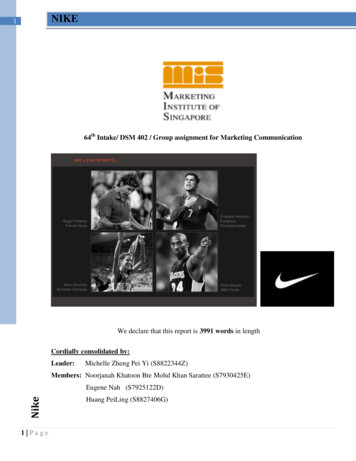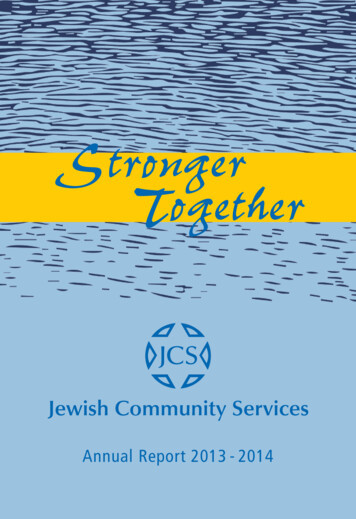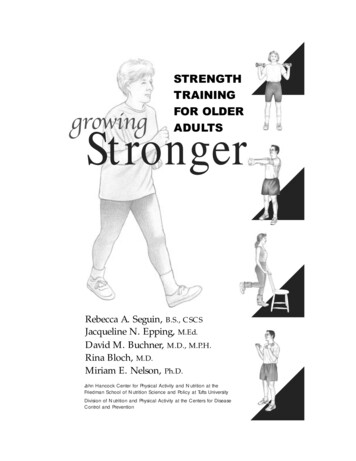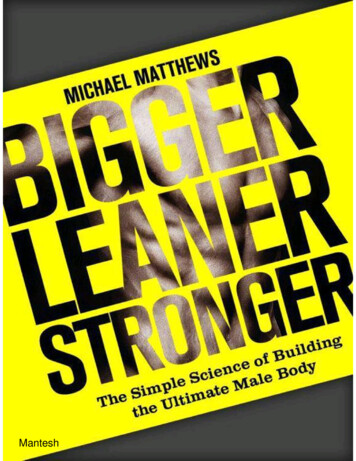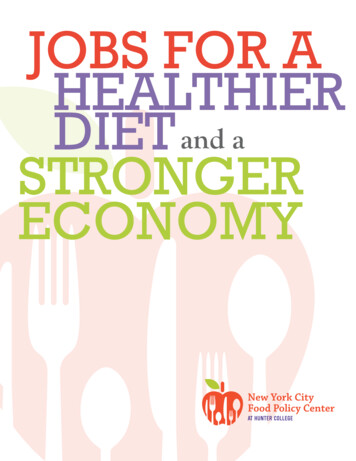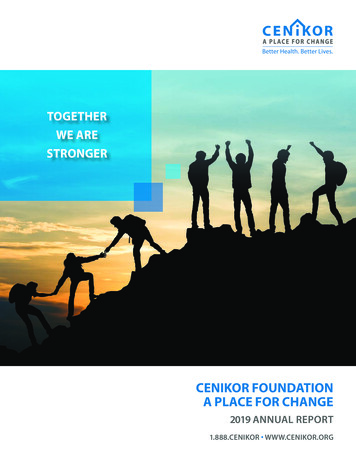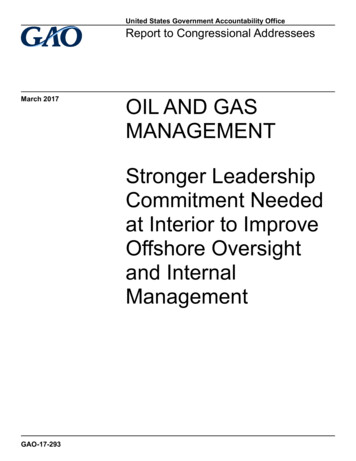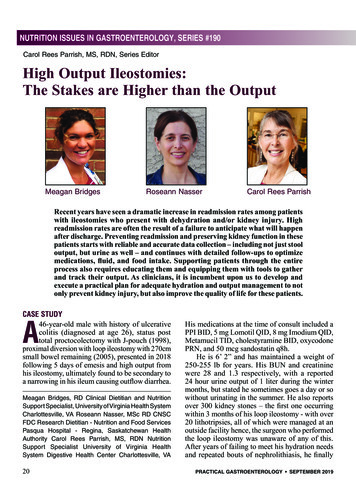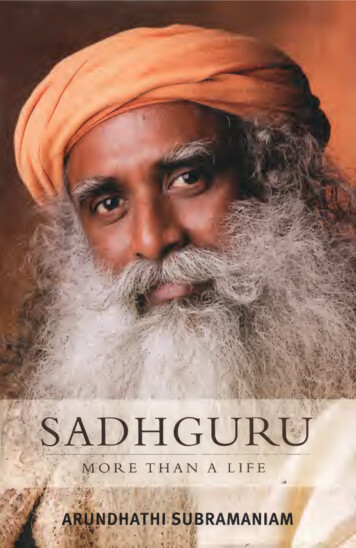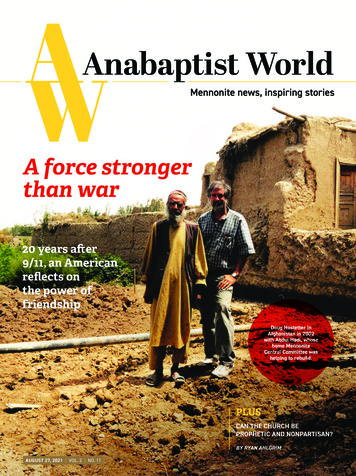
Transcription
A force strongerthan war20 years after9/11, an Americanreflects onthe power offriendshipDoug Hostetter inAfghanistan in 2002with Abdul Hadi, whosehome MennoniteCentral Committee washelping to rebuild.PLUSCAN THE CHURCH BEPROPHETIC AND NONPARTISAN?BY RYAN AHLGRIMAUGUST 27, 2021 VOL. 2 NO. 11anabaptistworld.org August 27, 20211
2anabaptistworld.org August 27, 2021
VOL. 2 NO. 11August 27, 2021FEATURESCOLUMNS0832A force strongerthan war#MeToo and boysSarah Kehrberg raises a sonin a society coming to termswith misogyny.BY DOUG HOSTETTER20 years after 9/11, anAmerican reflects on thecost of war and the powerof friendship.12Prophetic andnonpartisan?BY RYAN AHLGRIM33To cultivate or cut?17Common goal3515Canaan or Egypt?Living sanctuaryAs an immigrant, HendyMatahelemual sees hope inthe church, not the state.BY MELISSA FLORER-BIXLERA North Carolina congre gation gives priority tobeing a place of safety.1834Like Olympians, churchgoersneed good teammates.Pick a political side? Avoidcontroversy? The biblicalprophets show a third way.NEWSJenny Gehman asks: What istaking up too much space inmy vineyard?36Uninformed answers19MCC reaches goalLike Job, we speak “wordswithout knowledge.”DEPARTMENTS04 From the3-year centennial campaignraises 109.8 million.Executive Director05 Currents2006 Opinion: LettersShowing the wayEastern Canada conferencesets example of dealing withcases of sexual misconduct.07 Opinion: Editorial2237 Book ReviewOn the moveVaccine suspicion pushesLow German-speakingCanadians to immigrate.28 Higher Education2738 Wider World42 Classifieds43 ObituariesON THE COVER: Abdul Hadi, pictured with Doug Hostetter in August 2002, returned to his home in Qala Kuja, Afghanistan, three years after it wasdestroyed in fighting between the Northern Alliance and the Taliban. Mennonite Central Committee and Church World Service helped him rebuild.anabaptistworld.org August 27, 20213
FROM THE EXECUTIVE DIRECTORBY DANIELLE KLOTZAW’s first year:proving this worksIT HAS BEEN ALMOST A YEAR since welaunched Anabaptist World Inc. lastSeptember. Perhaps some of you arewondering how this new independentmedia company is working out. I’mglad to report we have had an expectation-surpassing year.When we began budgeting andplanning, there were a lot of uncertainties. Our staff would be larger thaneither of our predecessors, and some ofour expenses would be higher. But oursubscription list would be larger, ourdigital presence more expansive andour fundraising more frequent.Generally, I’m a cautiously optimistic person. Over the past year, I’vebecome more confidently optimistic.As editor Paul Schrag likes to say,“We’re proving this works.”Here are some of the things we havelearned this year:O Our donors are amazing. You’veheard me say this before, but itbears repeating: Subscriptionsand advertising are not enough tomaintain our work. We depend onfaithful donors to keep the pressesrunning and ink wells full. You havecome through in a big way, and weare grateful.O Subscriptions have held strong. Wehave about 8,100 print subscribers,very close to the number westarted with. Our goal is to grow thesubscription list, and even holdingsteady is good news at a time whenmany periodicals are declining inprint.This issue was mailed Aug. 20.4anabaptistworld.org August 27, 2021O Our digital and print audiences aremostly different people. Some ofyou receive the print issues and ouremail newsletters and follow us onsocial media. If you do, you are arock star, and you should email meso I can get you some special AWswag. But mostly, print subscribersare not digital readers, and withthis knowledge we are building ourmembership program, which consistsof individuals who give 5 or more amonth to support the digital contentthey love.O The work is just beginning. We’restill growing into our identity ofAnabaptist World — as a staff, boardand community of readers. WhenI feel overwhelmed with the workthat remains, I remind myself thateven when steps feel small or slow,movement is what counts.BEGINNING OUR SECOND year, wehope we’ll continue to hear from you.We love receiving your letters and connecting with you at events. It’s encouraging to hear that you are using AWin Sunday schools and sharing printissues with families and friends.Here’s my confidently optimistic prediction: Anabaptist World Inc. hasa great future.Anabaptist World Inc. is anindependent journalistic ministryserving the global Anabaptistmovement. We seek to inform, inspireand provide a forum for Mennonitesand anyone interested in Anabaptismto explore faith and culture.Established 2020, mergingThe Mennonite and Mennonite World ReviewSTAFFExecutive director: Danielle Klotzdaniellek@anabaptistworld.orgEditor: Paul Schrageditor@anabaptistworld.orgAssociate editor: Tim Hubertimh@anabaptistworld.orgBusiness manager: Dana Neffdanan@anabaptistworld.orgDigital strategist: Juan Moyajuanm@anabaptistworld.orgDesign: Hannah Gerig MeyerBOARD OF DIRECTORSDawn Araujo-HawkinsLarry GuengerichHans HoushowerMelody PannellMarathana ProthroDuane StoltzfusMarty TroyerKaren Flores VindelSheri WengerEDITORIAL OFFICE129 W. Sixth St., Newton, Kan.PO Box 568, Newton, KS 67114Phone: 316-283-3670Email: editor@anabaptistworld.orgSUBSCRIPTIONSOne year: 54 US, 70 Canadian. Orderonline at anabaptistworld.org or call316-283-3670. For information on grouprates, contact the Anabaptist World office.Email: danan@anabaptistworld.orgPO Box 568, Newton, KS 67114POSTMASTERSend address corrections to:PO Box 436, Congers, NY 10920-9819Anabaptist World (USPS 339-180, ISSN 08892156) is published 16 times per year — everythree weeks, with some four-week intervals — byAnabaptist World Inc., an independent nonprofitcompany. Periodicals postage paid at Newton, KS67114 and additional mailing offices.Scripture references are from the New RevisedStandard Version unless otherwise noted.
CURRENTSCATEGORYWith a new name,the battle againstapostasy continuesAmish farmers bale hay near Quarryville, Pa.,in 2012. PHOTO: DALE D. GEHMANA little breathing roomRonnie the Belgian draft horse had areal pain in the neck. As the leader ofthe seven-horse plow team on an Amishfarm near Clark, Mo., he struggled witha hole doctors put in his neck threeyears ago to help him breathe. TheMissourian reported the hole wouldroutinely get blocked by bugs, dirtand skin.An equine veterinarian at the Universityof Missouri heard about the problemlast summer and developed a hightech solution. Working with studentsin the university’s 3D printing club,Kevin Keegan created a first-of-its-kindflexible filter for Ronnie’s windpipe. Nowowner Menno Petersheim can clean andinsert the filter, keeping his seven-horseteam at full strength.The Fellowship of Concerned Mennoniteshas rebranded as the AnabaptistCouncil for Truth. Organized in 1984,FCM originally warned against theliberal “theological drift of the mainlineMennonite church,” according to thegroup’s news letter. But “the churchbureaucracy turned a deaf ear to theseappeals,” and “the battle to rescue the oldMennonite church from what we wouldconsider apostasy was essentially lost.”Since 1999, the Harrisonburg, Va.-basedgroup has refocused its mission to “warnthe alternative Anabaptist churches”by “expos[ing] theological drift in itsinitial stages rather than waiting untilthe bureaucracy of an organization hasalready set the course toward apostasy.”The name change signals a wider missionthat is not exclusively Mennonite.Remembering the first degree of separationHistorian C. Henry Smith is widely remembered as the first Mennonite to earn a doctoraldegree (in 1907). It has been generally forgotten that Bertha R. Leaman was likely thefirst Mennonite woman to do so. Lydia M. Nolt and Steven M. Nolt write in MennoniteQuarterly Review that Leaman’s 1935 University of Chicago degree and lifelongstudy of French history were supplemented by advocacy for women and internationalstudents. “Leaman, a young Mennonite historian from Lancaster County, Pa., faced adouble disadvantage as a female professional from a community that did not especiallyencourage higher education,” they write. “And particularly not on the part of women.” Shejoined the Quakers late in life, which may explain the muted response among Mennonitesto her success.PHOTO: CANADIAN OLYMPIC COMMITTEEGolden day forsoccer in CanadaCanada has another Mennonite with anOlympic gold medal. Sophie Schmidt(standing, center) and the CanadianWomen’s Soccer Team won thecountry’s first gold medal in women’ssoccer when they beat Sweden Aug. 6in a shootout at the Summer Olympicsin Tokyo. Schmidt is a member of KingRoad Mennonite Brethren Churchin Abbotsford, B.C. This is her thirdOlympic medal after winning bronzein 2012 and 2016. Her first Olympicappearance came in 2008.anabaptistworld.org August 27, 20215
OPINIONLetters &CommentsWrite to: editor@anabaptistworld.orgLittle steps toward peaceThank you for “In Pennsylvania orPalestine, Peacemaking Isn’t Passive”(June 18). My wife and I are relatively newto the Mennonite experience. We are notnew, however, to the Middle East experi ence. We assisted at Christian schools andsummer camps in Gaza and the West Bankbetween 2005 and 2018.Peacemaking in Pennsylvania and inthe Palestinian territories is an interestingcomparison. I don’t think minorities inPennsylvania are required to purchase alicense plate identifying their ethnicity, seetheir homes destroyed, water shut off andfarms confiscated, or jump through hoopsto be accepted in a Pennsylvania hospital— or be subject to about 200 other lawslimiting their human and civil rights.There are 167 Islands of Palestinianland in the West Bank, most not connectedto each other. Israeli settlers have madeinroads into the West Bank and have takenover about 30% of the area. A country ofPalestine seems improbable now.Peacemakers are rare among evangel icals, who are often so enamored with Isra el that they consider Palestinians obsta cles to the fulfillment of biblical prophecy.We met a Christian Peacemaker Teamin Hebron. They were amazing. Little stepstoward peace can add up.Stan George, Reedley, Calif.Wrong kind of loveJesus’ command was to love every one with divine love (agape), not homo sexual love. Sex should be private. Thehomosexual issue split the Lutheran andPresbyterian denominations and is nowsplitting Mennonite Church USA. With thewidespread circulation of AW, please don’tpromote gay/lesbian approval, as wasdone with two full pages about brothersmeeting at a Pride parade (July 9).Don Klassen, Harrisburg, S.D.It is evident the authors and churches in“Finding pride in my brother” and “Findingmy brother at Pride” do not embrace thelong-held confession that the Bible is ourword from God for faith and practice. TheBible addresses pride. It’s mentioned near ly 100 times. Twice the New Testament6anabaptistworld.org August 27, 2021says, “God opposes the proud but givesgrace to the humble” (James 4:6, 1 Peter5:5). Isaiah declared, “Woe to those whocall evil good and good evil” (5:20, New In ternational Version). Instead of practicingwhat God resists, I found God’s grace andfreedom to live victoriously over the sins Iinherited through the sin that infected thehuman race in Eden. I am disappointed toread endorsements of pride and sin in anAnabaptist magazine.Simon Schrock, Catlett, Va.A vision that should growThank you for “Tabor alumnus address es South Texas housing challenges” (July9). The work that Nick Mitchell-Bennett isdoing is remarkable and inspiring. There isa huge need for this in many communitiesin our country. I would love to see thisvision grow.Helen Horst Yoder, Wellman, IowaPeace Tax Fund ignoredI am disappointed that MennoCon21didn’t have a single seminar about theChurch Peace Tax Fund. Does MennoniteChurch USA understand the significanceof what its members are contributing tothe U.S. military with their tax dollars?Most are paying more to underwrite theU.S. military than they are giving to churchbudgets. How can we change that?Harold A. Penner, Akron, Pa.More memoirsI was delighted to see Dorothy NickelFriesen’s excellent review of James M.Lapp’s Remember Who You Are (Aug.6). For readers who want to know aboutother members of this family, all of whomhave contributed much to our church andworld, there are additional memoirs. MaryLapp Swartley’s My Treasured Hopes: MyFour Score Years is a moving accountof her life; its difficulties as the daughterof a bishop; her support of her husband,Willard; and her achievements.Memoirs of James’ brothers John andJoseph can be found in two volumes of theAnabaptist Center for Religion and Society,available on amazon.com. John’s “Re member Who You Are: Four Trajectories ofMy Life” is in Continuing the Journey: TheGeography of Our Faith, Mennonite StoriesIntegrating Faith and Life and the Worldof Thought. Joseph’s “Joining the FamilyBusiness: By Birthright, by Choice and byDivine Call” is in Making a Difference inthe Journey: The Geography of Our Faith,Brethren and Mennonite Stories Integrating Faith, Life and the World of Thought.Nancy V. Lee, Madison, Wis.Faith opposes scienceIn response to “Faith and Science Too”(Letters, Aug. 6): According to the Word ofGod, faith is in direct opposition to science.Science is studying things by observation.Faith is believing in things we can’t see.The word for science in Greek is gnosis.The one place gnosis is translated asscience in the Bible, it is with a negativeconnotation: “O Timothy, keep that whichis committed to thy trust, avoiding profaneand vain babblings, and oppositions ofscience falsely so called: Which some pro fessing have erred concerning the faith”(1 Timothy 6:20-21, King James Version).Some versions translate gnosis as knowl edge instead of science. But science is justhuman knowledge. God’s wisdom, whichis infinite, is entirely different from humanknowledge, which changes with new data.That’s why one day Dr. Anthony Fauci cansay we don’t need masks and the next saythe opposite.Kathryn Buskett, Fairhope, Ala.Indigenous erasureThank you for Sarah Augustine’scolumns on the Doctrine of Discovery.Her challenges about the treatment ofIndigenous people implicate much of ourlives. That includes the idea of Christiansbeing a special people and the idea ofprivate ownership of land. Of the formerevil we might be able to purge ourselvesby education and reflection, but for thelatter there isn’t much hope — virtually alleconomic systems depend upon privateownership of land. It is clear we won’t bereturning the stolen lands.However, there is an equivalent evil thatcould be stopped with rational behavior.That is the effort now going on in manypredominantly Republican states, underthe false pretense of large-scale voterfraud, to limit and suppress the rightto vote and, in some cases, even to letRepublican Party officials change electionresults they don’t like. The intent is clear:to make it harder for Black people and oth er minorities, including Indigenous people,to vote, or to limit the effect of their votesthrough the gerrymandering of congres sional districts. We should not continue toerase Indigenous people from the publicarena. After all, they were here first.Donald E. Voth, Albuquerque, N.M.Join the conversation by writing toeditor@anabaptistworld.org or AnabaptistWorld, Box 568, Newton, KS 67114. Lettersare edited; 250 words or fewer are preferred.Include your name and hometown.
OPINIONBY PAUL SCHRAG EDITORIALNot my will, but thineWhen seeking God’s purpose, is it possible to disregard our own desires?AT THE SOUTH CENTRAL MennoniteConference annual meeting July 24 inHesston, Kan., the chair gave instructions that raised a theological question.Be indifferent to your own opinions,he said. Only seek God’s will.The matter at hand was whether todissolve the conference. The rationalewas to avoid winners and losers — togive every congregation a clean slateto decide whether to remain a part ofMennonite Church USA.In the end, delegates decided not todissolve the conference. In a separatevote, they decided not to withdrawfrom the denomination (AW, Aug. 6).The instruction for delegates lingered in my mind because it was notjust a passing comment but emphasized repeatedly: What you desire isnot important. You need to find outwhat God wants.Is this good advice for Christiandiscernment? Is it even possible?It sounds good in some ways. Weall want to do God’s will. Perhaps themost admirable form of obedience isto submit humbly when our desirespoint in a different direction. God mayindeed ask hard things of us. Jesus setthe example: “Not my will, but thine”(Luke 22:42, King James Version).Sometimes this is a good way tomake a decision. But not always.It implies there is only one right answer. But not every question has onlyone right answer.Further, on some questions, it mightnot matter to God what we decide.I believe “Should we be a part ofMC USA?” is not a question we shouldexpect God to answer.It is a human organizational question — an important one, to be sure,but not one that is subject to a divineverdict.AS A RULE, DISCERNING God’s will iswhat the church should do. We searchour hearts and try to purge selfish motives. We pray for wisdom, both divineand human.The search for God’s will leansheavily upon the wisdom that comesfrom human minds and hearts shapedby the community of faith. Anabaptistsbelieve that through prayer, studyingScripture together and listening toeach other, human wisdom moves toward conformity with divine wisdom.The advice to be indifferent to ourown desires prompts a question: Is itpossible God wants me to belong toa church in which I feel miserable orstuck in conflict?I suppose it is possible. But it seemsmuch more likely that God wants eachShould I be a Methodistor a Mennonite? In orout of MC USA? God hasfaithful servants in allof these places.of us to belong to a church that givesus joy, a church whose people we love,whose mission inspires us.These criteria involve judgmentsabout our feelings, beliefs and opinions. These should be vital considerations, not matters of indifference,when discerning church affiliation.Most of us congregate with likeminded people. Yet many also see benefits in theological diversity. Even inan era of polarization, some of us aremoderate or hold opinions that don’tfit neatly into an ideological box.Some may be content to remain inchurches that frustrate them, becausethey love the people. Others feel compelled to leave because disagreementshave sucked the joy out of church life.Each can find their place withinGod’s purposes. All of us, with ourflaws, make up the body of Christ.With our gifts, the whole becomesmuch more than the sum of the parts.Though we seek unity, we should notbe surprised or disturbed when peoplehear God saying different things.The fact that South Central Conference delegates split almost 50-50 onwhether to withdraw from MC USAdoesn’t mean half of them failed todiscern God’s will. Or that half selfishlyfailed to become indifferent to theirown desires.It means South Central is a faithcommunity with a difficult, but notunique, challenge of sorting out itsdiversity.WE MIGHT COMPARE the question“What church should I belong to?” toasking whether it is God’s will to marrya certain person.Many people have prayed thisprayer. Few were indifferent to theirown desires. And rightly so.One can imagine God respondingwith questions in return: Do you lovethis person? Do you believe you willalways love him or her? Do you wantto be together for the rest of your life?If the answers are yes, God mightsay you have answered the question foryourself.“What denomination should I belong to?” seems like a similar question.Should I be a Methodist or a Mennonite? In or out of MC USA? God hasfaithful servants in all of these places.Each of us should find the communityof faith that we love. We should makeour choice and follow Jesus there.We should still pray about important decisions. Maybe we will hearGod’s voice clearly. Some of us arebetter than others at perceiving divineguidance.Even if we don’t pick up a clear signal, the very fact that we prayed,that we yearned to do God’s will, canset us on a path toward God’s preferred future.Because, as Jeremiah 29:11 says,God has plans for us. Just not an exactblueprint.anabaptistworld.org August 27, 20217
AFGHANISTANALTERNATIVE8anabaptistworld.org August 27, 2021
20 years ago,as the U.S.went to war, ahumanitarianmission showedthe powerof loveWBY DOUG HOSTETTERHEN I ARRIVEDin Afghanistan todeliver humanitarian aid sevenweeks after 9/11, the first question anAfghan farmer asked me was, “Why isthe U.S. attacking our country? Yourgovernment was so helpful when wewere occupied by the Soviet Union. Wethought America was our friend.”Fumbling for a response, I said,“A group of militants, from an organization with headquarters in yourcountry, destroyed two buildings a halfkilometer tall in New York City, killingalmost 3,000 people.”He looked confused. This appearedto be new information. We were inKunduz, a province with no electricity,running water or paved roads, wherethe tallest building was one story high.Twenty years later, people still areTop: Two girls near their home in Qala Kuja,Parwan Province, Afghanistan, August 2002.Bottom: Crossing the Amu Darya River from Tajikistan to Afghanistan in November 2001.From left are Suraya Sadeed, director of Helpthe Afghan Children; Doug Hostetter; RandallScerbo, documentary filmmaker, Oxygen Net work; and Michael Alan Lerner, journalist, LosAngeles Times Magazine. PHOTOS: DOUG HOSTETTERasking questions about theU.S. military response to theterrorist attacks of Sept. 11, 2001.Many of these questions center onthe impact of U.S. military action andthe consequences of the 20-year war.Many Americans understand the U.S.did not win the war, and they questionits high cost in blood and treasure. Butthey might not know what other choices their country might have made.In Afghanistan, and earlier in Vietnam, I have seen the futility of war andthe power of compassionate assistanceto restore hope and build friendship.My reflections on the 20th anniversary of 9/11 are informed by myconvictions as an Anabaptist Christian, service with Mennonite CentralCommittee in Vietnam 50 years ago,conversations with Afghans 20 yearsago and my role as MCC liaison to theUnited Nations from 2006 to 2018.The U.S. invasion of Afghanistan,and the 20 years of war that followed,have had profound and disastrouseffects on the U.S. and Afghanistan. Bymaking war, the U.S. turned a countrywhose people thought Americans weretheir friends into an enemy.FOR MANY AMERICANS, the logic ofthe Afghan war was clear: As the innocent victim of an unprovoked attack,the U.S. had to retaliate. On closerexamination, things get a bit messier.It is true Al-Qaeda militants basedin Afghanistan hijacked the planes thatdestroyed the World Trade Center andstruck the Pentagon. But the hijackerswere all Arabs, mostly Saudis, with nota single Afghan among them. GivenAl-Qaeda’s secrecy, it is highly unlikelythe Taliban leadership of Afghanistaneven knew the 9/11 attacks were goingA girl near a camp for displaced peoplein Khawja Badauddin, Kunduz Province,Afghanistan, November 2001.PHOTO: DOUG HOSTETTERto happen.When it was determined that Al-Qaeda carried out the attacks, theU.S. government demanded Afghanistan immediately arrest or expelAl-Qaeda leaders.The Afghan government requesteda few weeks to organize a Loya Jirga(grand assembly of Afghan traditionalI have seen the futilityof war and the power ofpeaceful assistance torestore hope and buildfriendship.leaders) to make that decision. TheU.S. refused and responded militarilywith massive bombings followed byground troops.The war was a blatant violation ofthe United Nations Charter and international law. The U.S. chose not tobring the matter to the U.N. SecurityCouncil but instead to initiate a warwith NATO allies.The attacks of 9/11 were seriouscrimes that should have broughtdecisive responses from law enforceanabaptistworld.org August 27, 20219
I asked Sadeed howshe could work inTaliban-controlledAfghanistan. Howwas it possibleto have a medicalclinic for womenand girls in Kabul?A boy plays soccer by the ruins of a Russiantank at the 19th-century mud-walled KololaPushta Fort in Kabul in July 2002.PHOTO: DOUG HOSTETTERment. Had the U.S. responded throughINTERPOL, the international policeorganization, most nations would havegiven their support. Russia, China, theEuropean Union, the United Nationsand even most Muslim countrieswould have joined the effort to bringthe 9/11 criminal plotters to justice.Instead, the U.S. alienated theMuslim world, and many of our allies,by starting a war that resulted in morethan 241,000 deaths, including 2,400U.S. service members.AS THE MOST POWERFUL country inthe world was preparing to attack thepoorest country in Asia, I contacted MCC and the American FriendsService Committee to ask if they wouldjoin with a previously planned Octobertrip to deliver food to Afghanistan. Asmall Afghan American organization,Help the Afghan Children, had organized the trip.MCC and the AFSC agreed. Theyasked if I would represent them andaccompany the organization’s director, Suraya Sadeed, to deliver food todisplaced people in northern Afghanistan.Sadeed played a key role in a storyof compassionate ministry to Afghan10anabaptistworld.org August 27, 2021people who suffered great tragedy dueto the U.S. war.She and her husband had emigratedto the United States in the late 1970sas the Soviets invaded Afghanistan. Adecade later, after the Soviet defeat,she returned to Afghanistan anddiscovered great need. She came backto the U.S., started a small charity andreturned regularly to assist children.I asked Sadeed how she couldwork in Taliban-controlled Afghanistan. How was it possible to have amedical clinic for women and girls inKabul?“There are good people in everycountry, every religion and even everypolitical organization,” she responded.“I found a Taliban leader I thought Icould trust. I asked, ‘What would youdo if your wife or daughter had a difficult pregnancy?’ ”He responded, “I would pray toGod.”“Yes,” Sadeed told him, “but thereare professionals who can save lives inchildbirth.”“We could never allow a doctor tosee a woman during childbirth,” heresponded.(All female doctors had been dismissed when the Taliban took over.)When she promised to staff the clinic only with women, he agreed.THEN, IN AN INSTANT, years of workwas undone.Just before we entered Afghanistan,Sadeed learned that chief pediatricianDr. Belquis, internist Dr. Rahma anda registered nurse from the clinic wereall killed in the U.S. bombing of Kabul.American bombs had also killedfour boys from the Help the AfghanChildren Vocational Training Center inJalabad.Friendship and hope can be fosteredthrough love and compassion — ordestroyed in an instant by the weaponsof war.Positive change cannot be imposedby outsiders, but culturally sensitiveassistance can make a difference. Withfunds from MCC, the AFSC and myfamily and friends, I was able to collect 60,000. Together with 70,000 thatHelp the Afghan Children collected, we were able to bring 130,000to neighboring Tajikistan. There asupplier would convert our funds into239 tons of wheat, sugar and cookingoil, which was loaded on 19 trucks andbrought across the northern borderinto Afghanistan.
A student on her way to schoolin Kabul, August 2002.PHOTO: DOUG HOSTETTERSadeed and I traveled ahead. A fewdays later in Afghanistan, our suppliescaught up with us. Afghans who hadfled the U.S. bombing further southwarmly welcomed us. We had enoughsupplies to feed 3,600 families of sevenfor one month.AS THE U.S. WITHDRAWS its last combat troops, some will say the militarymust remain so Americans can buildschools, modernize the country andprotect Afghan girls.Despite the rhetoric of politicians,wars are fought for material and strategic reasons, never for development,education or human rights.From years of working in a warzone (I served three years with MCCin Vietnam at the height of that war),I have learned the military does nothave the right equipment or trainingfor nation building or the empowerment of women.The U.S. has been in Afghanistan for20 years. We have sacrificed the lives ofthousands of U.S. service members andcontractors and tens of thousands ofAfghan civilians. Yet most Afghan people’s lives are worse today than whenthe U.S. invaded two decades ago.Change in Afghanistan will need tobe led by Afghans, not by foreignerswhose weapons have caused great suffering and claimed many lives. Socialchange must be driven internally, notimposed through military occupation.EIGHT MONTHS LATER, in 2002, whenit was safe to travel to Kabul, MCCasked me to return to Afghanistanto visit a home-rebuilding project inParwan Province. MCC was workingwith Church World Service to rebuildAfghan homes destroyed by war.I met again with Afghans who hadlost everything in the war. Once again,people welcomed me warmly as Ibrought a token of hope from peoplewho believe love is stronger than vengeance and nonviolence a better choicethan war.Doug Hostetter served with MCC from 1966to 1969 in Vietnam and October-November2001 and July-August 2002 in Afghanistan.He directed MCC’s United Nations office from2006 to 2018.anabaptistworld.org August 27, 202111
Shall we pick a politicalside and speak forit? Or simply avoidcontroversial issues?The biblical prophetsshow a third way — andour calling is both like,and unlike, theirs.CAN THECHURCH BEPROPHETIC ANDNONPARTISAN?AMOS: AN EQUALOPPORTUNITY OFFENDER“Thus says the Lord: For threetransgressions of Judah, andfor four, I will not revoke thepunishment.” — Amos 2:4“AMOS,” BY GUSTAVE DORÉ, 186612anabaptistworld.org August 27, 2021
demns Ahab for executing Naboth onfalse charges and stealing his vineyard. Hosea condemns Israel’s elitefor idolatry and faithlessness. Micahcondemns Judah’s rich for injusticesagainst the poor. Sixteen
Women’s Soccer Team won the country’s first gold medal in women’s soccer when they beat Sweden Aug. 6 in a shootout at the Summer Olympics in Tokyo. Schmidt is a member of King Road Mennonite Brethren Church in Abbotsford, B.C. This is her third Olympic medal after winning bronze in
